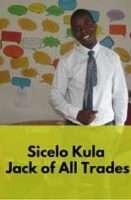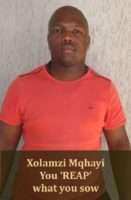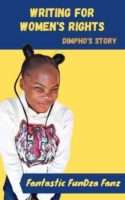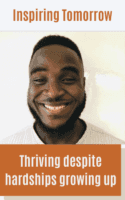It’s not every day that you come across a twenty-five-year-old who has a law degree and a novel to their name, but it’s safe to conclude that Sicelo Kula, from Philippi in Cape Town, is one of the sharpest knives in the drawer.
“I completed my law degree at the University of the Western Cape in 2015 and I’ve just launched my novel – titled Taking Chances – in March 2016. I was honoured to be in conversation about the book with the acclaimed and prominent thriller novelist Deon Meyer,” he says.
Sicelo’s book is the tenth in the Harmony High Series, published by Cover2Cover. This series depicts lives of teenagers living in a fictional township, and prides itself on high interest content for its audience.
Sicelo says his dream of writing a book stretches quite a way back. “I started developing a strong interest in writing after I had read two novels, in 2008, and that sparked the idea that a story could be brought into life on a page. I finally declared in class that in five years from then I’d write a book – and here we are!” he says, sounding thrilled.
Sicelo completed his matric at Woodlands High in Mitchell’s Plain in 2009, emerging as a top student. He was excelling academically, but the harsh reality of his daily life almost derailed his dream of venturing into fiction writing.
“Living in the shacks had its own challenges; there’s a lot of suffering that comes with that. But I couldn’t let that limit or define me, I had to rise above all that. My mom always emphasised the importance of education to us, from an early age. I remember, before I started school, she and my older brother made a huge effort in trying to make me have that interest in, and be excited about, education,” he recalls.
However, he reveals that his quest to be a writer wasn’t received with much enthusiasm from people.
“Problem is, we don’t have a culture of reading in South Africa. People thought writing would be a complete waste of my talents. But even though they may not have said, ‘Sicelo go be an author’, technically they allowed me to get the necessary skills to become a writer, by sending me to school.”
He partly blames himself for sleeping on his dreams for a while, but the dots soon connected.
“In 2012 I met this interesting lady and she was an author and I wondered, what was she doing to push towards her goal of writing a book? I jumped to Google and researched writing tips on how to write a short story, essay and novels, and that’s when I compiled my first ever short story. It went silent after writing the story cos I didn’t know where to begin writing a book.” Instead, he then started compiling poetry as well, in 2013.
Then FunDza held a writing competition, in September 2013, and Sicelo entered it after he saw posters.
“We were expected to write a 200-words-maximum story and then writers would be selected to go to a writing workshop and potentially win a grand for writing the best story. I thought the workshop could help me understand all the stuff I’ve been trying to learn off Google. I thought I had an interesting story. I could write about the tough transition from high school to varsity, because I suffered a lot at varsity. I thought I could bring that into life and narrate it in that 200 word essay.”
“I tried to put as much details as possible but I also needed to show them there was more to the story than just that 200 words. I was fortunate to be chosen to the workshop where I impressed, and won the competition. That was another stepping stone and I went from that essay to writing a commissioned story.”
One thing that made his story stand out was how he described his hardships in first year. Sicelo chose to quote this excerpt for us:
“My shoes looked like they had been patched by a blind man because I had repaired them myself. The first real belt I ever bought was in 2011; I had been using my brothers’ old belts. At school you could wear the same uniform the entire year but it was different at varsity. You had to wear casual clothes and my wardrobe was basically non-existent. I could only afford an apple the whole day, but how do you study when you’re hungry?”
Sicelo’s story captured many hearts and he quickly became such a favourite on the FunDza site that FunDza hired him.
“Eventually I started writing a blog called What’s Poppin’ eKasi as an ‘opinionista’, where I covered almost everything that goes down in the townships. I could then afford to buy myself clothes cos the blog brought in money as well.”
His novel, Taking Chances, was Sicelo’s next shot at sharing his life experiences.
“It’s everything I can relate to. I was also affiliated with a gang group and that affected my grades at some point. You can’t be a good student and a good gang member simultaneously. Another thing that kept me on the right track was that my mom would check my report card every end-of-term, and that details everything you’ve been up to. I had to be tread carefully cos I wanted my report to be good. I was feeling like an outsider trying to get in. I wanted to show that high school is a critical stage of your life. I wanted to convey the challenges youngsters face.”
Sicelo believes, ‘It’s not about what you know, it’s whom you know.’ “The aim was to encourage the youth to seek out people who have a different message to the easy message. The easy message is, ‘School is boring, let’s go out and have drinks. Forget about that homework – you can do it later etcetera’ . But your task as a young person is looking for the people that’ll give you that boring, but important, talk that you must arm yourself with the right tools to achieve in life – education being the main tool!”
The book touches on the importance of family relationships as well, something that Sicelo holds close to his heart, and just like writing a story, he believes you can’t skip from the introduction straight into the conclusion.
“There are no short-cuts in life; you can’t find a magical solution and just bypass everything and go to success. Sakhe (one of the characters) was good in soccer, and at school, but he didn’t want to succeed through those things. He wanted a quick fix solution and that’s how he got into the deepest trouble. Each character represents a lesson that I was trying to bring across. With Nosiphiwe I wanted to show that it’s possible to overcome your past, despite the mistakes you’ve made. Don’t let what happened yesterday define who you are today, and who you become tomorrow.”
Sicelo advises: “You should never box yourself in and let your circumstances suffocate you, nor let your problems accumulate to the extent that you can’t get yourself out. My brother always told me, ‘Sometimes you won’t have everything you need in order to get where you need to be, but that doesn’t mean you sit down in the corner and cry. You get up and use whatever you have in order to get where you need to be.”
The goal of Sicelo’s next chapter is to be successful in the field of law. “If you don’t know what you want to become, look at the natural things, those that come easy to you. I knew I didn’t make any mistake by choosing law because it involves writing as well, and my strengths involve writing and speaking. I’m focusing on everything that’s going on well in my life while trying to make a breakthrough into law.”
Responding to the critics that question the link between law and writing, Sicelo reminds us of Mandela’s famous quote: ‘It always seems impossible until it’s done’.
“Some of the greatest things in life were considered unrealistic until they were done. Flying was unrealistic but now it’s just another thing. The [great things] came into existence after someone had pushed for them,” he concludes.
Sicelo reminds me of Dave Berry’s quote: Never be afraid to try something new. Remember that a lone amateur built the Ark. A large group of professionals built the Titanic.





